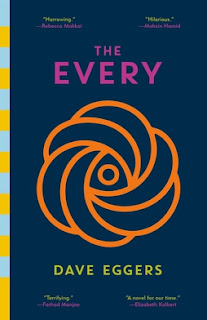THE EVERY (2021)
By Dave Eggers
Penguin Random House, 608 pages.
★★★★
The Every opens with these words:
This story takes place in the near future. Don’t try to work out when. Any anachronisms of time and physics occur on purpose. All errors pertaining to technology, chronology, or judgment are intentional and exist to serve you better.
If you recall The Circle (book or film), this is its sequel. For once, the second act is superior. The Circle was a Google/Not Google/Microsoft/Not Microsoft/Amazon/Not Amazon dystopia. Dave Eggers pulls no such punches in The Every; his corporation bent upon global control is Amazon. As we come in upon The Every, it is busy acquiring three companies a week for the sole purpose of stripping them of any value and destroying them—all in the name of “saving” humankind from the horrors of competition, inefficiency, waste, and crippling choice. Moreover, it claims to be saving the planet. Its main campus on Treasure Island in San Francisco Bay has banned plastic, has mandatory recycling of virtually everything, is scent-free, and vegetarian.
Think of The Every as Orwell crossed with a take-down of cancel culture and seemingly benevolent fascism. One of its (many) mottos is “sharing is caring.” In that spirit, every employee is perpetually connected to devices and various apps that make all their medical data available, advise when to drink, when to exercise, and when to sleep. Anything that can’t be measured is deemed worthless and the ovals worn on the form-fitting lycra of Every employees rates all activities, including positive green flashes for using multi-syllabic words or giving low scores for not posting enough content each day. (It doesn’t matter what.)
Its founder, the Bezos-like Eamon Bailey, has given over the company reins to Mae Holland. (They are holdovers from The Circle.) Holland, though, is rumored to be on shaky ground as she hasn’t had a new idea in ages (whatever that might mean in such an instant feedback world). The company’s reach has become so universal that only a few “trog” pockets exist and even they are under heavy surveillance. (Motto: “peace through surveillance.”) Since almost everyone is connected, why not harvest data to “improve” the world? Another motto: “clarity is objectivity.” The data is “clear,” for instance, that Norman Rockwell is the greatest artist who has ever lived. FictFix can clean up old novels and removal material that might distress a reader.Does such a world scare you?
It scares Delaney West, a young woman from Idaho now sharing a San Francisco trog apartment with odd duck Wes Makazian. She’s very smart and wants to take down Every, but as a lit major she needs Wes’ tech savvy. The idea is to secure a job at the main campus, learn its vulnerabilities, and create apps that are so outrageous that the masses will stir rise up in anger to destroy the global monolith. How about an app that allows anonymous employees to report on the micro aggression of someone else? Or one that uses Alexa-like devices to listen for words or angry voices and report them to the police so they can intervene to prevent a crime before one happens? What else can be promoted in the name of making people feel “safe?” AuthentiFriend measures who really cares about you, another assures voting rights for Every account holder, and still another makes consumer choices so you won’t make a mistake. StayStïl allows you to “travel” without leaving the Every, thereby reducing the carbon footprint and saving possible discomfort such as observing animals harming each other.
There are rumblings in the air. Is Holland the target of a palace coup? Are there other trog sympathizers on Treasure Island? What can Delaney come up with that would be the proverbial final straw? Can she hide without disconnecting and thereby calling attention to herself? Then again, who can’t be co-opted in a globe full of sheeple? Is Delaney or anyone else fooling anyone? And the ultimate question: What if most of the world likes being told what to do?
If you’re a trog, The Every is a chilling look at a dehumanized future brought on by its very victims. One wonders whether Eggers’ opening comments are meant to be smug, cautionary, or ironic, though that is essentially a debate over each of his books. He is open to the charge of launching a personal vendetta against Amazon, but that doesn’t necessarily make him wrong. If you enjoy irony embedded in irony, though, you can buy The Every on Amazon!
Rob Weir








